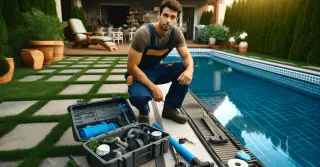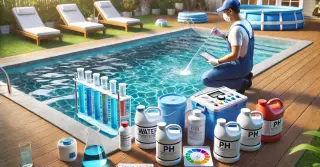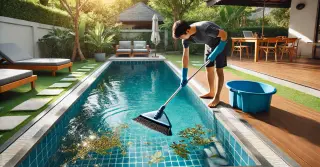Consistent pool maintenance is crucial for keeping your pool clean, safe, and enjoyable. Failing to maintain your pool can result in algae growth, cloudy water, and equipment failures. By following a regular maintenance schedule, you can prevent these problems and ensure a healthy pool.
Essential Cleaning TasksEnsuring a clean pool requires routine cleaning tasks. These tasks help eliminate debris, prevent algae, and maintain clear water.
- Skimming and Brushing: Regular skimming clears leaves, insects, and other debris from the water surface. This stops debris from sinking and contaminating the water. Brushing the pool walls and floor removes dirt, algae, and other buildup that can cause staining and slippery surfaces. Routine skimming and brushing keep your pool looking pristine and prevent algae growth.
- Bottom Cleaning: Using a pool vacuum to clean the bottom removes dirt and debris from the bottom. Automatic pool vacuums can make this task easier, but manual vacuuming may be necessary for thorough cleaning. Regular vacuuming maintains water clarity and prevents debris buildup.
Maintaining Water ChemistryMaintaining balanced pool water is vital for a safe and comfortable swimming experience. Proper chemical levels prevent algae growth, bacteria, and other contaminants, and protect pool surfaces and equipment.
- Water Testing and Adjustment: Frequently testing the pool water to measure chlorine, pH, alkalinity, and calcium hardness is crucial. Make adjustments to chemicals as needed to maintain proper balance. Utilizing a quality test kit helps you accurately measure these levels, so you can make necessary adjustments.
- Pool Shock Treatments: Shock treatments involve adding a high dose of chlorine to the pool to eliminate bacteria, algae, and other contaminants. This is important after heavy use or significant weather events. Regular shocking keeps the water clean and safe.
Maintaining Pool FiltersThe pool's filtration system plays a key role in keeping the water clean. Regular maintenance of the filter maintains its efficiency.
- Cleaning Filters: Depending on your filter type—cartridge, sand, or diatomaceous earth (DE)—cleaning methods will vary. Cartridge filters need to be removed and hosed down to clear dirt and debris. Sand and DE filters require backwashing to clean out the trapped particles. Consistent filter cleaning keeps the system running smoothly and ensures clear water.
- Changing Filter Media: Eventually, filter media will need replacement. For sand filters, the sand should be replaced every 3-5 years. Cartridge filters should be replaced every 1-2 years. DE filter grids require replacement every 3-5 years. Frequently replacing filter media maintains optimal filtration and water quality.
Regular pool maintenance is essential for a clean, safe, and enjoyable swimming experience. By adhering to a consistent maintenance routine, you can ensure your pool remains in top condition for the long term.



